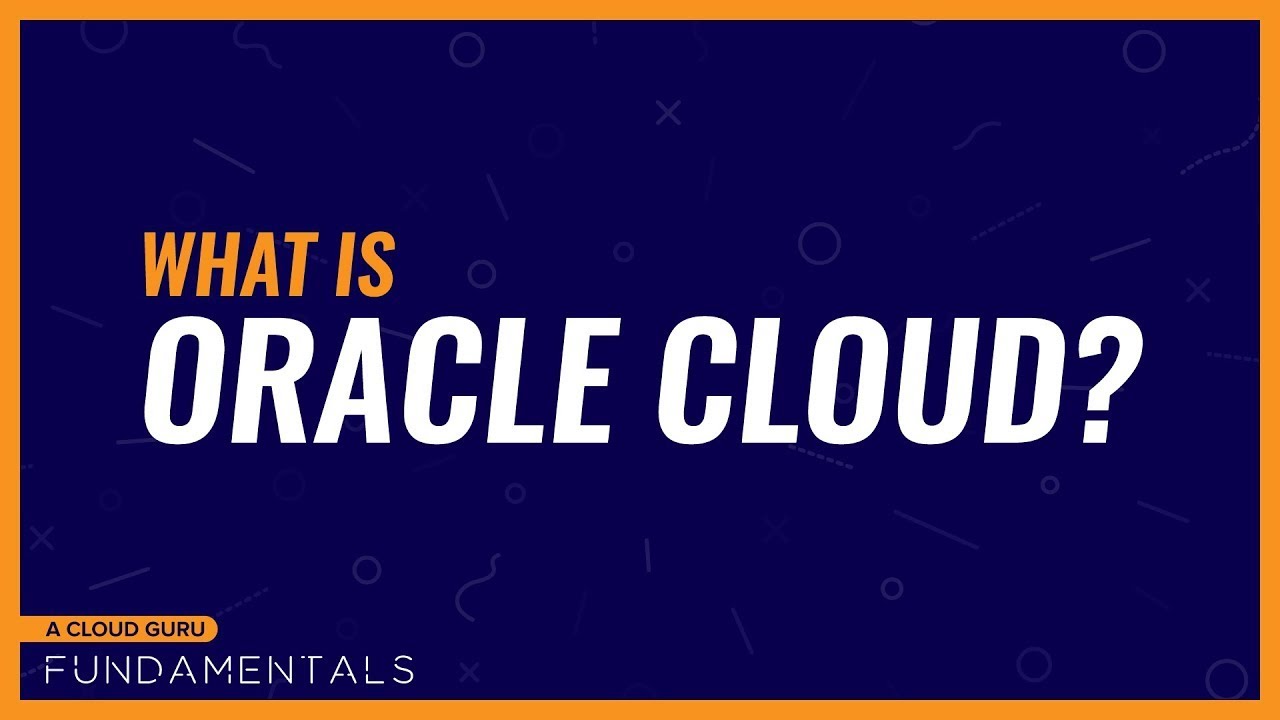In Cloud Consulting
What is Oracle Cloud? - read the full article about cloud technology 2021, Cloud Consulting and Data migration, Cloud infrastructure management from A Cloud Guru on Qualified.One

Youtube Blogger

Whats up gurus? Today, we will be talking about Oracle cloud.
We will examine what Oracle cloud is, how it fits in with the other cloud players and why you should care about it.
As we move along, were going to focus on two different viewpoints.
One, you as a potential Oracle business user, and two, you as a student thinking about getting Oracle certified. Of course, any review of Oracle cloud, wouldnt be complete without a discussion of its famous autonomous database.
In case you dont know, an autonomous database is a mixture of a traditional database with machine learning to provide a host of advantages.
But before we get into the detailed benefits of Oracle, lets start with a brief 30 minute history of how Oracle cloud formation began. Just kidding.
No one wants to hear that.
The reality is Oracle cloud is one of the newer players in the field, starting at the end of 2016.
Theres basically two different groups of cloud right now.
Theres the industry leaders and the niche players.
Gartner has a really nice graph that explains the details and gives you a rough outline of the lay of the land. As you can see here, Amazon web services, Microsoft Azure, and Google cloud are the leaders in this space and Ali Baba, Oracle, IBM, and Tencent find themselves in the niche player section.
Although Oracle is currently listed as a niche player, they have the customer base and the desire to grow into an industry leader like the big three. When looking at this graph, its important to understand that niche doesnt necessarily mean second tier.
In fact, these platforms might offer the best option for you depending upon your specific needs. With that in mind, were going to grab waders and head on into some deeper water.
Im going to talk to you now about the services that Oracle provides and who the most likely targeted users are, in my opinion.
To start off with, we need to take a look at reliability and data regions.
Oracle calls these cloud regions. Oracle has currently over 30, including government, basically anywhere you need to be Oracle is.
This is reinforced with Oracles partnership with Microsoft.
There are currently multiple regions that share an interconnection between Oracle cloud and Microsoft Azure.
This allows customers to move easily between applications in the cloud.
As far as reliability, Oracle has a reliable infrastructure that is backed by a very thorough end-to-end SLA that covers, performance availability and manageability of services.
While of course there are a ton of services that we can talk about in Oracle cloud. Im going to focus in on a few of Oracle strengths.
The first is bare metal cloud.
This is a collection of cloud services that let you build the environment that you need. Bare metal services means no hypervisor, just physical compute nodes.
This is extremely helpful if you need high performance, which usually means something to do with databases. You want greater control, better cost management. Basically you have more freedom to do what you want.
The cost of this comes in the form of more skills and time required to configure the system as you like it.
If you find yourself unfamiliar with these concepts of bare metal servers, hypervisors and the like, you probably will find that Oracle is a weaker fit than some of the big three as Oracle in general requires more cloud knowledge while were on the subject of databases. Lets talk about Oracle cloud database options.
These are absolutely the greatest strength of Oracle cloud, which shouldnt be a great surprise.
Seeing as Oracles largest customer base is database driven.
Oracle exadata for instance, is a computing platform optimized for running Oracle database.
It excels at online transactional processing OLTP applications that are running simultaneously.
Autonomous databases are another database suited for OLTP.
It combines machine learning with a cloud database to provide a service that allows for automated patching, optimization, backup and its self-repairing. Finally, lets talk about on-premises. Oracle, especially excels at migrations and support of hybrid environments.
Oracle design, their cloud environment with one of their primary targets being their existing user base. That user base is almost exclusively on premises.
With that knowledge, Oracle has designed many helpful features for users to migrate into the cloud.
They also have a very robust support model for hybrid environments as well.
While Oracle is clearly growing at a massive rate, their biggest weakness at this stage is once you step outside of that core use case and into the lower end offerings or more edge cases, the features dont match up well against larger competitors like Microsoft or Amazon.
So lets try and wrap all of this up into a summary of Oracle strengths by taking a look at what I would see as an ideal customer.
Lets do this by looking at two use cases. The first is Zoom.
Zoom is a massively popular platform for online meetings.
One of the main reasons zoom chose Oracle over other cloud providers is because of price.
Zoom has hundreds of thousands of terabytes of traffic flowing through the cloud every month and Oracle cloud charges significantly less for data transfer pricing.
So use case one massive amounts of data transfer or storage could make Oracle a great choice over other cloud providers due to their competitive price offering. Our second use case is Oracle database users.
You will find that Oracle has built their cloud with this use case in mind, from pricing to support the database options to hybrid And on-prem, theres a ton of things to like about Oracle cloud or existing work or users.
So now that weve dived into Oracle, the strengths, weaknesses, ideal users, lets take a minute to summarize and take a look at this from one more angle.
Oracle has definitely targeted large scale database users with high traffic and storage requirements and their current customers as ideal targets for Oracle cloud. This is not to say that there arent other use cases.
Oracle is absolutely growing in leaps and bounds in their offerings and based on their partnership with Microsoft and an almost doubling of cloud regions in 2020, this is a trend thats expected to continue.
They do offer free trials and have a pretty robust cloud cost estimator.
So I would absolutely suggest that you check that out, poke around a little.
That brings me to my last point, continued learning.
So you might find yourself listening to this and thinking will getting an Oracle certification helped me in my career.
The answer is a resounding yes, there is an immense value and understanding competing platforms.
It makes you a more sought after candidate provides you with greater insight into where a potential customer may be coming from, and it broadens your understanding of cloud concepts.
I highly suggest anyone in cloud takes some time to learn a couple of different platforms, and I will specifically call out the Oracle cloud foundations or Oracle cloud architect associate as great targets that will help give you a foundation.
Into Oracle cloud. Well, thats it for this video gurus, take some time to poke around in the free Oracle cloud offerings.
And most importantly, keep growing and learning youll thank yourself later till next time.
A Cloud Guru: What is Oracle Cloud? - Cloud Consulting

